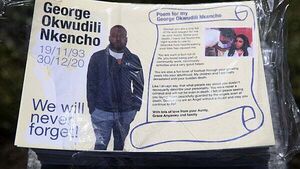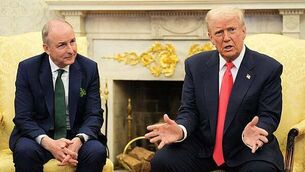George Nkencho inquest to hear from up to 60 witnesses but faces delay until 2026

Seán McCárthaigh
A full inquest into the fatal shooting of George Nkencho by gardaí outside his home in west Dublin five years ago will not begin before early 2026 after a coroner was informed that her plans to hold it in November might be unrealistic.
A brief sitting of Dublin District Coroner’s Court heard on Monday that around 50-60 witnesses are expected to be called to give evidence at an inquest which is expected to last over two weeks.
Mr Nkencho (27) suffered fatal gunshot wounds during an incident involving members of the Garda Armed Support Unit outside his family home at Manorfields Drive, Clonee, Co Dublin on December 30th, 2020.
Counsel for An Garda Síochána, Ronan Kennedy SC, told the hearing that gardaí had reviewed 252 witness statements and additional material that had been provided to them by the coroner, Myra Cullinane.
However, Mr Kennedy said gardaí were still in the process of reviewing other material that had only been received on June 24th including a report of the investigation into Mr Nkencho’s death by Fiosrú – previously known as the Garda Síochána Ombudsman Commission –as well as some media clips.
The barrister said there was a body of work still to be undertaken in relation to such documentation about which various stakeholders within An Garda Síochána would need to be consulted.
Mr Kennedy said gardaí would need several more weeks for that process to be finalised.
Dr Cullinane said she was conscious that she had not been able to share such documents to date with Mr Nkencho’s family and their legal representatives and wanted to provide them with such material “at the earliest opportunity.”
The coroner restated her intention, which she had made earlier this year, of holding the inquest before the end of 2025.
“I really want to move things along,” said Dr Cullinane.
The coroner said she also wished to hold a hearing in advance of the full inquest to hear submissions on the scope of her inquiry which she did not believe would be contentious.
Dr Cullinane acknowledged that legal representatives would need to consider the relevant documentation to make such submissions.
However, Mr Kennedy expressed concern that the issue of the scope of the inquiry might impact on issues relating to privilege over certain documentation.
He suggested that the coroner deal with the question of the scope of the inquest at a hearing scheduled for September 12th to update Dr Cullinane on progress in the case.
However, counsel for the Nkencho family, Seoirse Hennessy BL, said that would be “putting the cart before the horse.”
Dr Culliane agreed that it would not give the victim’s relatives the opportunity to form a view in the absence of having considered the documentation.
The coroner said she aimed to hear the inquest in November but realised the timeframe was “tightening all the time.”
Mr Kennedy asked Dr Cullinane if she believed that date was realistic given the amount of work still to be undertaken and the possibility that any ruling on the scope of the inquest could have “a knock-on effect.”
The coroner replied that she did not wish to raise the expectation of Mr Nkencho’s family about the start of the inquest and then disappoint them.
“We won’t aim for something that’s not possible,” she said.
The coroner noted that the inquest would likely last “a little over two weeks,” even though she believed the evidence of most eyewitnesses was unlikely to be challenged to any significant degree.
She adjourned the hearing until September 12th to allow An Garda Síochána to complete its review of documentation before it would be shared with all parties.
Dr Culliane said she would also correspond with them in advance of that date to see if they might be in a position to make submission on the scope of the inquest.
At the opening of the inquest in June 2021, legal representatives of Mr Nkencho’s family called on the coroner to conduct a wide and broad examination of policing issues to consider if his death was linked to racial profiling and discrimination.
In reply to concerns raised by Mr Hennessy about jury selection which would normally be arranged by gardaí, the coroner said she was confident that Fiosrú would be able to assemble a representative panel of jurors for the inquest.
She also confirmed that Fiosrú had been granted full legal representation for the inquest
Addressing members of Mr Nkencho’s family at the hearing including his mother, Blessing, Dr Cullinane observed that it was always the case that when she set a date that they “tend to shift a little further.”
However, the coroner said the inquest would not be delayed unduly.
Earlier this year, it emerged that an appeal by Mr Nkencho’s family against the decision of the DPP that no garda should face prosecution over his death was unsuccessful.
The fatal shooting of Mr Nkencho outside his home in west Dublin occurred after a stand-off developed between gardaí and the deceased who was armed with a kitchen knife.
The tense situation arose shortly after Mr Nkencho had been involved in an alleged assault of a shop assistant at a nearby Eurospar store.
The young man, whose family come originally from Nigeria, was pronounced dead a short time later at Connolly Hospital Blanchardstown.
Post-mortem results revealed he died as a result of multiple gunshot wounds to the torso.
His family claim he was suffering from mental health issues for several months before his death and that the level of force used against him by gardaí was disproportionate.
At a hearing in May 2025, the coroner ruled that two members of the Garda Armed Support Unit involved in the fatal shooting would be given anonymity at the inquest in the interest of their security and “national security.”




